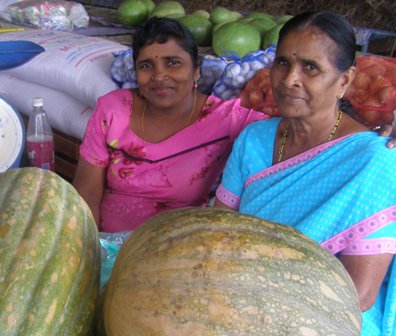International Women's Day Special: Empower rural women – end hunger and poverty
Date:

Most Pacific Island governments have made commitments to advance gender equality by ratifying the Convention on the Elimination of All Forms of Discrimination Against Women (CEDAW), signing up to the Beijing Platform for Action, Millennium Development Goals and United Nations Security Council Resolutions.
However, despite these achievements, “women in the Pacific continue to be constrained by persistent and near-universal gender discrimination,” says the United Nations Entity for Gender Equality and the Empowerment of Women (UN Women) Regional Programme Director, Elzira Sagynbaeva.
International Women’s Day, 8 March, is a timely reminder that women’s priorities, needs and concerns must be redressed in order for Pacific women to reach their full potential. This year’s theme for the UN observance of IWD is “Empower Rural Women – End Hunger and Poverty”.
“Rural women face more difficulties than their male counterparts in gaining access to public services, social protection, employment opportunities, and local and national markets and institutions due to cultural norms and security issues” says UN Women Executive Director, Michelle Bachelet.
Research from Australia National University shows that although Pacific Island women frequently produce the majority of food for subsistence, they have far less access to further agricultural training and infrastructural support than their male counterparts, who frequently control more lucrative cash crop production.
In Fiji, according to the 2007 Census, female unemployment is still about two times higher than male unemployment. There is also disparity in the economic situation of women in the urban and rural areas. Whilst women in urban settings have access to paid employment, those in rural areas predominantly engage in the informal sector as evident in the Employment and Unemployment survey published in 2007.
Furthermore, the low status of women and children in the Pacific Island Countries also increases their vulnerability to violence, exploitation and abuse. Rural women and children in the Pacific who have been victims of such forms of violence often experience difficulties in accessing support services, as reported by the Australian Agency for International Development in 2008.
Steps are needed to address these critical challenges.
Participatory approaches, stakeholder consultations, and support for rural and women’s organizations can help ensure that rural women’s priorities are reflected in macroeconomic policies and rural development and agriculture programmes.
Temporary special measures, such as quotas and benchmarks, can quickly increase rural women’s leadership in national and local governance and help build capacity for their effective participation in relevant processes.
“Now is the time to expand rural women’s leadership, participation and economic empowerment,” states Madame Bachelet.
Enhancing Women’s Economic Empowerment is one of UN Women’s focus areas. To strengthen the economic security and rights of women market vendors in the Pacific, UN Women initiated a regional project Partners Improving Markets (PIM) in PNG, Vanuatu, Solomon Islands and Fiji.
The project aims to help women market vendors to organize and to document and analyze their situation, represent their interests through regular dialogue with local government, participate in decision-making to influence market by-laws, asset development and maintenance and local government budget allocations for market development and improvement.
In 2012, UN Women produced two knowledge products to inform policy makers, planners, and political leaders and to provide training to support the mass organization and collective voice of vendors in visioning, planning and budgeting better markets, Pacific Markets and Market Vendors: Evidence, Data and Knowledge in Pacific Island Countries and Rural Pacific Island Women and Agriculture: A Literature Review and Annotated Bibliography.